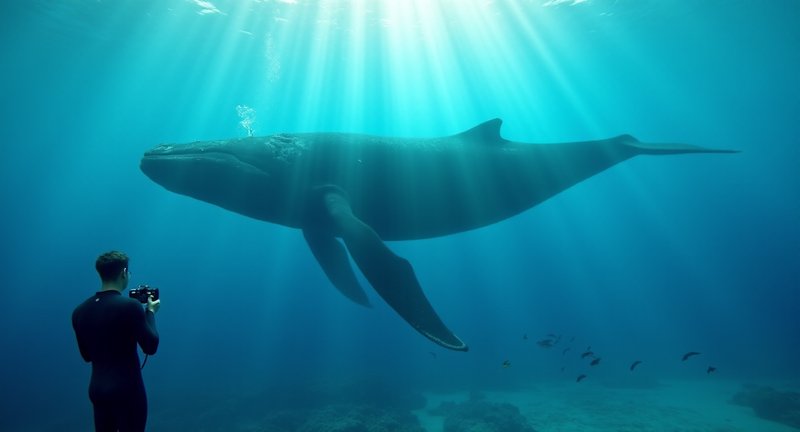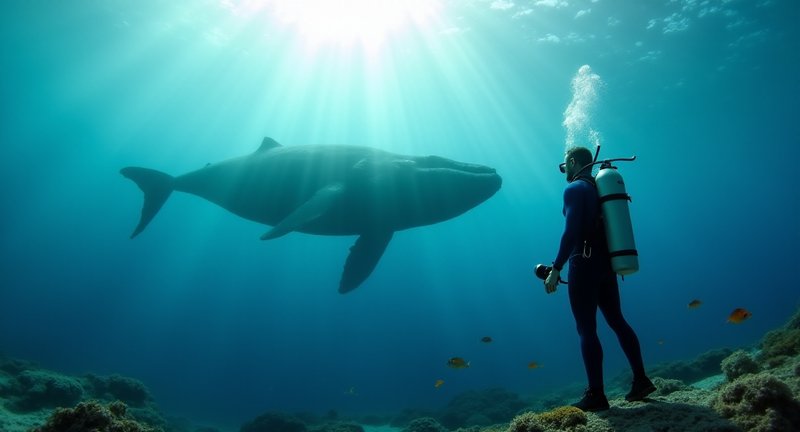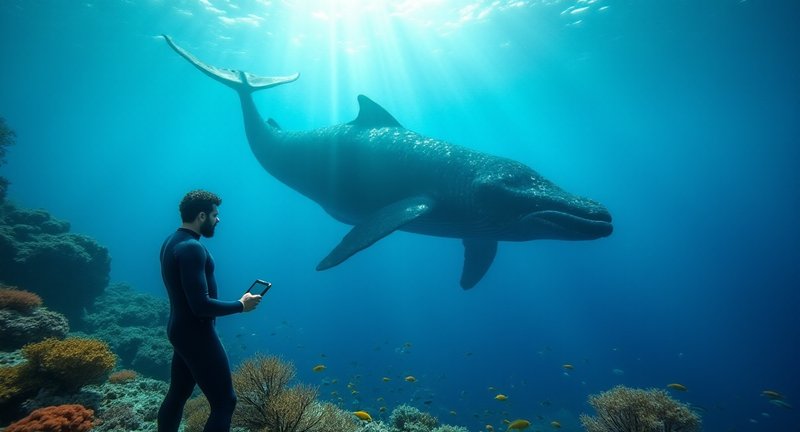The Essentials of Whale Average Lifespan
When we think about the life of a whale, we are often struck by the grandeur of its existence. You know, the sheer size of these creatures, combined with their deep, soulful eyes, makes one wonder about the journey they’ve been on. Understanding the whale average lifespan gives us a glimpse into just how long these ocean giants swim the seas.
Most whales live long lives, some even outliving us humans. Imagine this – a blue whale can gracefully cruise the ocean for around 70 to 90 years, sometimes more. It’s astonishing how time and nature work together, allowing these gentle behemoths to explore the deep for such an extended period.
Now, what’s fascinating is the diversity within species. A sperm whale might live for 60 years, while a bowhead whale? Well, they take the crown, easily reaching 200 years or more. Yes, centuries. It’s almost as if the ocean itself grants them extra time, letting them witness eras of change we can’t even fathom.

So why does the average whale lifespan vary so much? It’s all about lifestyle. A whale’s environment, diet, and even its predators play a role in shaping how long they will roam the waters. In fact, I like to think of them as the ultimate survivors of the sea, facing challenges but thriving in ways only whales can.
There’s something humbling about knowing that whales live through generations of our own history, silently navigating the deep, reminding us of the vastness of time. Next time you think about a whale, remember they’re not just swimming they’re living long, storied lives.
The Facts About Whale Average Lifespan
When dealing with the grand creatures of the ocean, whales are a special case. They seem to drift through time as effortlessly as they glide through the sea. If you’ve ever wondered just how long they stick around, the answer might surprise you.
Some species of whales live for decades, while others are known to reach well over a century. It’s a staggering thought, isn’t it? Picture yourself walking down a street, and passing someone who’s seen the world change for over a hundred years except these creatures live in the ocean, and their street is the deep blue.
What’s fascinating is how varied their lifespans can be. Some species enjoy longer lives than others, but there’s no denying that they all carry an ancient wisdom. I often think about what stories a whale would tell if we could sit down for a chat.

A big part of their long life comes down to the harsh, yet awe-inspiring environment they navigate. Life in the wild ocean isn’t easy, but whales have mastered the art of survival. Their slow pace and large size might be part of the secret to their endurance.
In the end, their lifespan is as vast and mysterious as the ocean itself. We can only admire and respect these gentle giants for the time they are given, and the world they show us during their journey.
Understanding Whale Lifespan
When we dive into the world of whales, we can’t help but marvel at their majestic lifespans. These ocean giants truly live on a different time scale than we do. Imagine living a life that stretches across decades, sometimes centuries talk about seeing the world evolve right before your eyes!
Different species of whales have quite varied lifetimes, so let’s break it down a bit. Some of the smaller whales, like belugas or orcas, tend to live for about 40 to 60 years. However, the really fascinating part is with the larger ones. Take the bowhead whale for instance these guys are the Methuselahs of the ocean. They can live over 200 years! Think about it: these creatures might still be swimming around in Arctic waters long after two or three human generations have passed.
If you want to wrap your head around how whales live such long lives, a few key factors come into play:
- Species: Larger whales generally live longer.
- Environment: Cold, deep waters seem to offer some longevity benefits.
- Diet: A steady, sustainable food source helps their bodies age gracefully.
- Predators and Threats: While humans unfortunately pose the biggest threat today, many whales naturally live with little threat from predators.
I often wonder what a whale’s life must feel like, living slow, calm, and undisturbed for centuries. The rhythms of the ocean must really become part of their very being.
So next time you’re out by the sea or watching a nature documentary, think about the long lives these creatures lead and the stories they could tell if only they could speak!
Factors Affecting Whale Longevity
Whales are majestic beings, carrying with them centuries of stories beneath the waves. What influences their long lives, you ask? Well, it’s a delicate dance between biology, environment, and sheer survival instincts.
First, genetics play a massive role. Just like in us, certain whales seem almost blessed with the blueprint for longevity. Species like the bowhead whale, for instance, have cellular mechanisms that seem to slow the aging process.
But there’s more to it than just DNA. The food they consume, their diet, makes a difference too. Rich in nutrients and proteins, their meals from the deep oceans can bolster their health, giving them the vitality needed for survival.
Now, let’s not forget about their predators or rather, the lack of them. Whales at the top of the food chain tend to live longer simply because fewer threats loom over their heads. You’ve got to appreciate the freedom that comes with fewer enemies!
The environment plays its part, too. Cleaner waters and abundant food sources naturally support longer lives. And, yes, whales benefit from fewer human interruptions, which is becoming increasingly rare in today’s bustling oceans.
Diseases and natural events also affect their longevity. Just like humans, they face health risks that can shorten their lives unexpectedly. But some are resilient, weathering storms and sickness like ocean-bound warriors.
In the end, it’s a mix of luck, biology, and circumstance that determines just how long a whale will roam the seas. These creatures are living proof that nature’s rules of longevity are far from simple.
Different Species and Their Lifespans
Whales are extraordinary creatures, each species boasting its own rhythm of life, and trust me, they’re not all racing against the clock. Some whales, like the killer whale, live their lives with a burst of energy, usually around 50-80 years. They’ve got a bit of a sprinter’s spirit in the marathon of the ocean, but don’t let that fool you they still enjoy the long swim.
Then there’s the fin whale, which tends to glide through life at a more steady pace, reaching ages of 60-90 years. It’s almost as if they’ve mastered the art of balance between swift motion and serene longevity.
And of course, the bowhead whale holds the title for patience and endurance, living up to 200 years. Imagine all the stories this whale could tell after two centuries beneath the waves! It’s like meeting the wise elder of the deep, silently observing generations pass by.
Different species, different journeys each lifespan as diverse as the lives they lead. It’s fascinating to see how some whales live for what seems like forever, while others have their time in the ocean breeze cut a bit shorter.
I often marvel at these differences. It’s as if the ocean itself grants each whale a unique passage, each one following its own current of time.
How Age is Determined in Whales
Have you ever wondered how we figure out the age of a whale? It’s not like they carry ID cards or birth certificates in those deep blue oceans. Over the years, scientists have come up with some truly fascinating methods to unravel this mystery. It’s a bit like nature’s version of detective work, piecing together clues from the anatomy of these majestic giants.
One of the most common ways we figure out a whale’s age is by studying their earplugs. Yes, you read that right whale earwax! These creatures produce waxy plugs in their ears that build up over time, and just like the rings of a tree, these layers can reveal the whale’s age. Each layer represents a season, so counting them gives us an estimate of how long the whale has been cruising the ocean.
There’s also a lot to learn from their teeth. Not all whales have teeth, but for species that do like sperm whales their teeth hold age-related secrets. Similar to earplugs, teeth grow in layers. These growth rings can be examined to see how old the whale is. It’s a bit of a puzzle, but it works!
Additionally, scientists sometimes analyze the bones, particularly the jawbone, to estimate age. Bones, like teeth and earwax, bear the marks of time, making them a useful tool in understanding a whale’s life cycle.
To sum it up, the techniques used to determine a whale’s age are incredibly diverse, ranging from earplugs to teeth, and even bones. It’s a reminder that in the animal kingdom, time leaves its marks in the most unexpected places.
Common Myths About Whale Lifespan
Concerning the age-old question of how long whales live, there’s no shortage of myths swirling about. Some people believe whales are practically immortal, while others think they have the same lifespan as your average pet dog. The reality, of course, is far more fascinating.
You might be surprised to know that the Whale Average Lifespan varies greatly depending on the species. Take the bowhead whale, for example these giants of the Arctic can live over 200 years, defying expectations. Yet, many people assume all whales live to this ripe old age, which simply isn’t true.
On the other hand, not all whales boast this extreme longevity. Some, like the orca, can live anywhere from 50 to 90 years. And while that’s still impressive, it certainly challenges the notion that whales are near-eternal creatures of the sea.
I’ve often heard folks say that whales have a “natural immortality,” which, frankly, is more poetic than factual. Yes, they live longer than many animals, but they face their own set of natural limits. Just like us, whales are subject to the whims of genetics, predators, and environmental changes.
So, next time someone throws around the idea that whales live for centuries, remind them of the reality: Typical lifespan of whales is a captivating mix of longevity and mortality, shaped by factors most of us wouldn’t even consider.
Environmental Impact on Whale Lifespan
Whales live their lives intertwined with the oceans, deeply affected by the environmental shifts around them. I’ve seen how changes in ocean temperature, pollution, and even noise levels from human activity leave their mark on these magnificent creatures.
Pollution, especially plastic waste and chemical runoff, seeps into their food chain. You wouldn’t believe how toxins accumulate over time, shortening the lifespan of these gentle giants in ways we are still learning to comprehend.
Even the rising temperatures of our seas play a sneaky role. Whales migrate and feed differently when their habitats warm, and their health can be impacted when food sources become scarce or unpredictable.
One thing that really stands out to me is the underwater noise pollution. Ships, sonar, and industrial activities disrupt their communication, leading to increased stress. This kind of chronic stress, as we humans know all too well, can chip away at health over time.
And of course, let’s not forget about entanglement in fishing gear or the loss of biodiversity, which limits the availability of their preferred prey. Every aspect of their environment is connected, creating ripple effects that are hard to miss once you start paying attention.
The fascinating part is, whales are survivors. They adapt, but there’s only so much they can handle. It’s a delicate balance that’s getting harder to maintain.
The Role of Diet in Whale Longevity
When I dive into the fascinating world of whales, I can’t help but marvel at how their diet plays a crucial role in their impressive longevity. It’s almost poetic to think that what these magnificent giants consume can influence their survival over decades. Allow me to share my insights on this vital aspect of their existence.
Dietary Influences on Whale Longevity
Whales are not just big fish; they are intricate beings with specific nutritional needs. Their diets primarily consist of:
-
Krill and Small Fish: Most baleen whales feast on krill, tiny crustaceans packed with essential nutrients. These power-packed morsels provide energy and sustain their massive bodies.
-
Squid and Fish: Toothed whales, like orcas, often hunt larger fish and squid. This high-protein diet fuels their agile movements and sharp minds.
-
Plankton: For some species, plankton serves as a vital food source. It’s like a buffet of nutrients, helping them maintain robust health.
Beyond just food types, the quality of their diet is paramount. Whales rely on rich, nutrient-dense meals to thrive, just like we need wholesome foods for our vitality. Here are a few considerations:
-
Fatty Acids: Omega-3 fatty acids found in their prey are essential for maintaining healthy cell membranes and combating inflammation.
-
Vitamins and Minerals: Just like a well-balanced human diet, a whale’s intake of vitamins and minerals supports their immune system, aiding in disease resistance.
-
Hunting Grounds: The availability of food is tied to their migration patterns. Whales travel vast distances in search of rich feeding areas, often leading them to waters teeming with life.
In essence, the choices these gentle giants make at mealtime resonate throughout their long lives, reminding us that what we eat matters. So next time you ponder whale tales, consider the wonders of their underwater diet.
Whale Average Lifespan: A Full Examination
Whales are some of the ocean’s most majestic creatures, captivating us with their size and grace. Yet, what truly piques my curiosity is how long these gentle giants glide through the watery depths.
From my own observations, I find it fascinating that different species of whales boast varying life spans. For instance, the mighty bowhead whale is a true marvel, potentially living for over two centuries! Imagine that a creature swimming the seas long enough to witness the ebb and flow of time like no other.
Conversely, orcas, which are often called killer whales, tend to live significantly shorter lives, generally spanning around 30 to 50 years. Still, these social beings leave an indelible mark on the waters they traverse, creating intricate family bonds that last a lifetime.

When considering the life of a whale, it’s crucial to ponder the environmental challenges they face. Pollution, climate change, and hunting have all contributed to their struggles. Reflecting on my experiences, I’ve come to appreciate the urgency of conservation efforts aimed at protecting these magnificent mammals.
I often find myself daydreaming about these enormous creatures gliding effortlessly through the deep blue, embodying the essence of freedom. Their existence teaches us resilience and the importance of nurturing our planet.
So, the next time you hear a distant song of a whale, take a moment to marvel at the wisdom and stories hidden beneath the surface. They are not just creatures of the sea; they are ancient beings whose lives deserve our reverence and protection.
Natural Predators and Whale Lifespan
As I dove deeper into the world of whales, I became fascinated by their complex relationship with nature and the mysteries surrounding their existence. It’s incredible to think about how these majestic creatures navigate through life, all while dodging the myriad threats that come their way. So, let’s unpack the natural predators of whales and the elements that affect their longevity.
Natural Predators
While adult whales have few natural enemies, certain predators can pose a threat, especially to younger or smaller individuals:
- Orcas (killer whales): Often referred to as the “wolves of the sea,” orcas are highly intelligent hunters and can target smaller whale species.
- Sharks: Certain large shark species, like the great white, may occasionally prey on whale calves.
- Humans: Unfortunately, our impact is significant. From whaling practices to boat strikes, humans remain one of the most dangerous predators in the ocean.
Factors Influencing Longevity
Whales are remarkable not just for their size but for their endurance. A multitude of factors influences how long they thrive in our oceans:
- Species Variation: Different whale species have varying lifespans. For example, a bowhead whale can live over 200 years, while others may only reach a few decades.
- Environmental Threats: Pollution, climate change, and habitat loss can severely impact their health and survival.
- Diet and Health: Access to abundant and nutritious food is crucial. Healthy diets lead to healthier, longer lives.
- Social Structure: Whales often live in pods, where social bonds can provide protection and support, enhancing their chances of survival.
In my exploration, I’ve found it profound how each aspect of a whale’s life intertwines, shaping their journey through the vast, blue expanse of our oceans. So, the next time you gaze at the ocean, consider the rich context of life that exists beneath the surface, particularly the incredible stories of whales.
The Impact of Climate Change on Whales
Climate change is reshaping the oceanic world, and the majestic whales are caught in the turbulence. These gentle giants are not just fascinating creatures but also vital indicators of our planet’s health.
As I watch documentaries about them, I can’t help but feel a profound connection. It’s disheartening to see how rising temperatures and melting ice are altering their habitats and migratory patterns. Imagine navigating through a home that’s constantly changing; it must be bewildering for these intelligent beings.
One of the most alarming effects is the diminishing availability of their primary food sources. With ocean currents shifting, the tiny creatures they depend on are becoming scarce. This shift creates a domino effect that could ripple through the entire ecosystem, impacting everything from krill to humans.
It’s not just the food supply that’s at stake; noise pollution from ships and other human activities is adding to their struggles. I often think about how sensitive these animals are, relying on echolocation to communicate and hunt. Increased noise can disorient them, making the ocean feel like a cacophony rather than a home.
Whales also face the threat of entanglement in fishing gear and collisions with vessels. Each year, many of these magnificent beings are lost to such tragic encounters, a stark reminder of our impact on their lives. I can’t help but feel a sense of responsibility each of us has a part to play in safeguarding these extraordinary animals.
In this dance of climate change and conservation, we must remember our role as stewards of the sea. Protecting whales isn’t just about saving a species; it’s about ensuring the harmony of our entire marine ecosystem.
Human Activities and Their Effects on Longevity
As I reveal the intriguing world of human activities and their effects on longevity, I’ve come to appreciate the vibrant context of our daily choices. From the lively embrace of hobbies to the subtle art of mindfulness, our actions can sculpt our years in remarkable ways.
Consider these fascinating human activities that can have profound impacts on our longevity:
-
Physical Exercise: Engaging in regular physical activity, whether it’s a brisk walk in the park or a spirited dance class, fuels both body and spirit. It’s like giving your heart a joyful workout, reducing stress and bolstering overall health.
-
Social Connections: Surrounding ourselves with friends and loved ones can create a sturdy support system. Those moments of laughter shared over coffee or deep conversations during dinner play a crucial role in keeping our spirits high and our minds sharp.
-
Creative Pursuits: Whether it’s painting, writing, or crafting, diving into creative activities can be immensely fulfilling. It’s a delightful way to express oneself and can even sharpen cognitive functions, promoting mental agility.
-
Lifelong Learning: Embracing new knowledge whether through books, online courses, or hands-on experiences can keep our brains buzzing with activity. It’s like giving our intellect a refreshing breeze that keeps us youthful at heart.
In my own journey, I’ve found that integrating these activities into my life not only enhances my daily enjoyment but also whispers sweet secrets of longevity. It’s a beautiful reminder that the way we engage with the world can indeed elongate our experiences, enriching them in countless ways.
Notable Records of Long-Lived Whales
When we dive into the depths of marine biology, one of the most captivating aspects is the longevity of whales. These majestic creatures have some incredible records that are nothing short of astonishing. From my own explorations and research, I’ve learned that their life spans can often outlast human lifetimes by decades. Let’s take a closer look at a few notable records that showcase their remarkable endurance:
-
Bowhead Whale: Known for its impressive longevity, the Bowhead whale can live over 200 years. Imagine swimming through the Arctic waters for two centuries!
-
Gray Whale: These beauties can reach ages of up to 70-80 years, gracefully migrating thousands of miles annually.
-
Sperm Whale: With a robust lifespan of around 70 years, these deep-divers are the giants of the ocean, known for their intelligence and social structures.
-
Narwhal: Though less studied, narwhals can live up to 50 years, with their unique tusks making them one of the ocean’s most intriguing mysteries.
-
Orca: Perhaps one of the most famous, orcas, or killer whales, can live to be 90 or more, with matriarchs often leading their pods well into their later years.
In sharing these fascinating facts, I can’t help but marvel at how these creatures adapt to their environments over such lengthy periods. Their long lives are filled with challenges, from predation to changing oceanic conditions, and each record tells a story of survival and resilience. If you’re ever fortunate enough to spot one of these magnificent beings, just remember that they’re not just a sight to behold they’re living history.
The Reproductive Lifespan of Whales
When we think of the majestic giants of the ocean, the reproductive journey of whales is truly fascinating. These magnificent creatures have unique life cycles that offer a glimpse into their biological mysteries.
Whales generally experience a lengthy reproductive phase, allowing them to contribute to their populations over many years. Depending on the species, females may give birth every two to three years, nurturing their calves with exceptional care.
I remember reading about the nurturing bond between a mother whale and her calf. It’s heartwarming to imagine this enormous creature guiding her young through the vast ocean, teaching them essential survival skills.
As they reach maturity, usually in their late teens or early twenties, these marine mammals embark on their own reproductive journeys. With each generation, the legacy of these gentle giants continues, sustaining the intricate web of life in the ocean.
Interestingly, some species, like the bowhead whale, can reproduce into their sixties. It’s a testament to the resilience and adaptability of life in the deep blue sea.
The mystery surrounding whale reproduction reminds me of our own life cycles. Just as we grow and learn, whales pass down their knowledge to the next generation, creating a rich context of life beneath the waves.
So, the next time you find yourself near the ocean, take a moment to reflect on the incredible reproductive journeys of these colossal beings. They remind us of the beauty of life and the importance of nurturing future generations.
Frequently Asked
Can whales live 200 years?
Yes, some whale species are known to have remarkable lifespans, with certain individuals potentially reaching ages of 200 years or more. The bowhead whale, for instance, is often cited for its longevity, with studies suggesting they can live up to 211 years or even longer. Their slow maturation and unique biology contribute to this extended lifespan, allowing them to thrive in the challenging conditions of the Arctic and sub-Arctic waters where they are primarily found.
Can whales live 500 years?
While there is no concrete evidence to suggest that any whale species can live up to 500 years, the Greenland shark, which is not a whale but a related species, is known to have a potential lifespan that approaches this age. Recent studies indicate that Greenland sharks can live for several centuries, with some estimates suggesting they may reach ages of around 400 years. However, whales generally have maximum lifespans that do not exceed 200 years.
Can a blue whale live 100 years?
Yes, blue whales can live to be around 80 to 90 years old, with some estimates suggesting that individuals may reach up to 100 years in rare cases. Their longevity is influenced by various factors, including their environment, health, and the availability of food resources. Blue whales are the largest animals on Earth, and their long lifespan allows them to contribute significantly to their ecosystems over time.
What is the longest a whale has lived?
The longest-lived whale on record is the bowhead whale, which has been documented to reach ages of over 200 years. One bowhead whale was found to be approximately 211 years old based on eye lens analysis. These findings highlight the extraordinary lifespans of these marine mammals, which have adapted to their environments and developed survival strategies that allow them to thrive for such extended periods.
What animal can survive 1000 years?
The ocean quahog, a type of clam, holds the title for one of the longest-lived animals, with some individuals estimated to live for over 500 years. However, there is currently no known animal that can survive for 1000 years. While some species, like certain jellyfish and sponges, have remarkable regenerative capabilities, the quest for a true 1000-year lifespan remains elusive in the animal kingdom.
Can orcas live 100 years?
Yes, orcas, or killer whales, have the potential to live up to 100 years, although their average lifespan is generally shorter. Female orcas typically live longer than males, with some females known to reach ages of 90 to 100 years. The longevity of orcas can be affected by various factors, including environmental conditions, availability of prey, and social structures within their pods.
Can Greenland sharks live for 500 years?
Yes, Greenland sharks are among the longest-living vertebrates, with some individuals estimated to live for 400 years or more. Research involving radiocarbon dating of their eye lenses has provided insights into their ages, revealing that these sharks grow extremely slowly and reach sexual maturity only after several decades. Their extended lifespan allows them to adapt to the harsh conditions of the Arctic and North Atlantic oceans.
What animal on Earth lives the longest?
The animal that is known to live the longest on Earth is the ocean quahog clam, which can live for over 500 years. Other contenders for longevity include certain species of sponges, and jellyfish, with some species like the Turritopsis dohrnii being biologically immortal. However, when considering vertebrates, the Greenland shark holds the record for the longest lifespan, with estimates reaching up to 400 years.
What is the oldest living thing?
The oldest living organism on Earth is often considered to be a species of bristlecone pine tree, known as Methuselah, located in California’s White Mountains. This tree is over 4,800 years old. However, clonal organisms like the Pando aspen grove in Utah, which is estimated to be around 80,000 years old, could also be considered the oldest living entity, as it shares a single root system despite being made up of many individual trees.
Which sea animal can live to be 200 years old?
The bowhead whale is a notable sea animal that can live to be over 200 years old, with studies indicating that they can reach ages of around 211 years or more. This impressive lifespan is attributed to their unique biology and ability to thrive in the cold Arctic waters. Their longevity is essential for maintaining the balance in their marine ecosystems as they have a significant role in the oceanic food web.
What animal has the longest lifespan in the world?
The ocean quahog clam holds the record for the longest lifespan of any animal, with some individuals estimated to be over 500 years old. Their longevity is remarkable, as they can endure harsh conditions and survive for centuries by living in ocean environments. This clamshell has provided scientists with insights into aging and environmental changes over the centuries, making them important for studying marine biology and ecology.
Can whales live 100?
Yes, many whale species can live to be around 100 years old, though the exact lifespan can vary by species. For instance, gray whales typically live to be around 50 to 70 years old, while humpback whales can reach up to 50 years. Some larger species, like the bowhead whale, can exceed this age significantly. Factors such as their environment, diet, and threats from human activities can impact their overall longevity.











The way whales live these long, tranquil lives, moving through the deep blue, is something I’ve always admired. It’s fascinating how their size, environment, and even what they eat all play such a huge role in their longevity. The idea that bowhead whales might outlive multiple generations of humans is incredible to me! It’s almost like they live in an entirely different reality where time flows slower. I love how you mentioned their calm, undisturbed rhythms with the ocean. That’s such a beautiful way to think about their existence. Imagine the world they must know, living for centuries and adapting to all the changes in their environment. It makes me appreciate how connected they must feel to the ocean’s ebb and flow. If only we could learn from their peaceful, slow-paced way of life! And you’re right – watching a whale documentary or seeing one in person definitely makes you think about these things.
Wow, I love the idea of whales “walking” their own ocean street. They truly live in a world we can barely comprehend! I always thought of them as wise creatures, and it’s amazing how long some of them live, especially the way they seem to move so calmly through life. There’s something magical about them. It’s as if time works differently for whales, which makes me wonder what stories they would tell if we could understand them!
I’ve always been fascinated by how whales, with their massive size and calm nature, manage to live such long lives. It’s almost like they’ve cracked the code to a balanced life in the sea! The thought that some bowhead whales can live over 200 years is just mind-blowing. I wonder if they have some kind of ‘whale wisdom’ from witnessing centuries of ocean life. They’ve seen so much of the Earth change while just gracefully swimming through it all. It’s humbling to think about how much more there is to their world that we don’t even understand. Their resilience, especially with all the environmental changes, really makes me appreciate them even more. Whales are truly nature’s gentle giants.